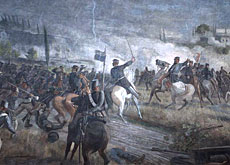The cradle of international humanitarian law

Switzerland is the birthplace and home to international humanitarian law (IHL) and the International Committee of the Red Cross (ICRC).
As depository of the Geneva Conventions, Switzerland partly owes its peaceful reputation to Henry Dunant, whose experiences of the Battle of Solferino would have a profound effect on his life.
As depository of the Geneva Conventions, Switzerland partly owes its peaceful reputation to Henry Dunant, whose experiences of the Battle of Solferino would have a profound effect on his life.
The Battle of Solferino was a violent confrontation between the Franco-Sardinian Alliance and the Austrian army for the independence of Italy that was fought on June 24, 1859 near Lake Garda in northern Italy.
Once the fighting calmed down, over 40,000 soldiers lay dying on the battlefield, many suffering from horrendous injuries.
The Geneva businessman was deeply affected by the butchery that he had chanced upon and, with help from local people, organised first aid for the wounded and sick.
Back home, he wrote a book about his experiences entitled “A memory of Solferino” and developed an idea to form an organisation to assist the war wounded as a contribution towards creating a more civilised world and alleviating the sufferings of war.
Horrific
In the book Dunant wrote: “There is absolutely horrific hand-to-hand fighting between the Austrians and the allies. They are knee-deep in corpses, slaughtering each other with rifle butts, sabres and bayonets. There is no mercy. It’s a total bloodbath – a fight between bloodthirsty wild animals; even the injured have to defend themselves and those who lose their weapons rip each other apart with their teeth.”
In 1863, with his first-hand experience of the slaughter of Solferino still fresh in his mind, Dunant and four Swiss acquaintances created a committee that would later become the International Committee of the Red Cross.
One year on, with the support of the five founding ICRC members, the Swiss government organised a diplomatic conference attended by 16 states, which led to the signing of the first Geneva Convention.
The treaty fixes limits to the rules of war, establishing the humanitarian treatment of battlefield casualties.
In 1901, Dunant was awarded the first-ever Nobel Peace Prize for his role in founding the International Red Cross Movement and initiating the Geneva Convention.
IHL has evolved over the years with the support of the ICRC and the Swiss government.
Today IHL, also known as the law of war, the laws and customs of war or the law of armed conflict, comprises the four Geneva Conventions and the Hague Regulations, as well as subsequent treaties, case law, and customary international law.
Almost universal
Almost all member countries have approved this body of law, which covers the war-wounded, prisoners and civilians.
“Switzerland is the depository country of the Geneva Conventions, which are international treaties specifically intended to protect victims of conflict and ensure their dignity,” ICRC spokesman Ian Piper told swissinfo.
“Our activities now cover all aspects of war, such as protection of prisoners and civilians, visits to detainees and weapon issues,” he added.
Piper explained that the ICRC could also offer its services to work in situations of internal violence or when there were natural disasters occurring in conflict zones.
To protect victims, the ICRC refrains from publicly denouncing human rights abuses or other such violations by combatants. By seeking to maintain dialogue with the authorities, though, the ICRC fulfils a different, but complementary role to that of non-governmental organisations.
But a recent example – US detention of 500 “enemy combatants” at Guantanano Bay – shows how, despite numerous international laws, in certain crisis situations the issue of universality and the application of humanitarian law are still not fully accepted.
A humanitarian multinational
The ICRC’s presence in the field has continued to grow, especially in more inaccessible regions of the world. Hundreds of thousands of volunteers from 170 national Red Cross and Red Crescent societies work for the Red Cross Movement on a daily basis, often in extremely tough conditions.
“In 2005 ICRC delegates visited 570,000 detainees in more than 80 countries,” said the ICRC spokesman.
In 2006 the overall ICRC budget stands at SFr1 billion. Africa receives the lion’s share of ICRC assistance – 40 per cent of its budget – in particular the Darfur region in western Sudan, which is currently torn apart by armed conflict.
In 2005 the ICRC provided shelter and improved access to drinking water for over 20 million people. The organisation also supported various hospitals and distributed essential household items to approximately 2.2 million people.
swissinfo, Marzio Pescia
International humanitarian law (IHL), which is based on the four Geneva Conventions, is a set of rules that seek to limit the effects of armed conflict. It protects persons who are not or are no longer participating in the hostilities and restricts the means and methods of warfare. IHL is also known as the law of war, the laws and customs of war or the law of armed conflict.
The ICRC’s mandate includes the promotion application and development of IHL.
During a conflict the ICRC coordinates the activities of national Red Cross and Red Crescent societies with the support of the International Federation of Red Cross and Red Crescent Societies.
The ICRC was founded in 1863 as a neutral and independent organisation.
It is the guardian and promoter of international humanitarian law.
The Geneva Conventions, which are deposited in Switzerland, have been signed by every country.
No other international treaty is accepted by all nations.

In compliance with the JTI standards
More: SWI swissinfo.ch certified by the Journalism Trust Initiative
You can find an overview of ongoing debates with our journalists here. Please join us!
If you want to start a conversation about a topic raised in this article or want to report factual errors, email us at english@swissinfo.ch.